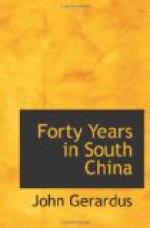It may not be generally known that in Amoy we have a “Union English Church,” with regular Sabbath services in English. These services were conducted by the missionaries in turn. And we fear it may also not be known what Dr Talmage’s powers as a preacher were. He was a very prince among English preachers; and if he had remained in America this would very soon have been acknowledged. There were no tricks or devices of manner or words employed by him for winning the popular ear. He never seemed to forget the solemnity and responsibility of his position in the pulpit. He hesitated not “to declare the whole counsel of God.” He stands before me now as I listen with bated breath to the fire of his eloquence, denouncing where denunciation was needed, contending with a burning earnestness that never failed to carry us with him, for “the faith once delivered to the saints,” and then with exquisite tenderness seeking to draw his hearers to Him who is Saviour and Brother. He never failed to think and speak as much about temptation as about sin. It was a real feast to attend the English service when it was conducted by him. And during all my time in Amoy, there was always a large congregation when Dr. Talmage was the preacher.
He was not all tenderness. He would only have been a one-sided man if this were all. He was as strong as he was tender; a keen and powerful opponent in discussion. And we often had very warm and keen discussions; keener and warmer than I had ever seen before I went to Amoy, or have ever seen since. We had to discuss principles and methods of translation, hymnology, Church work, Church discipline, and many other subjects. And there was no mincing of matters at these discussions. Foremost amongst us was Dr. Talmage, tenaciously and persistently advocating the view he happened to have taken on any question. There were men of very strong individuality among us, and these gave as good as they got. I can recall these scenes, but I cannot recall a single word he said that involved a personal wound or left a barb. When it was all over he was the same loving brother, and not an atom of bitterness was left behind. By us, the brethren of the English Presbyterian Mission, he was looked up to as a revered father, just as much as he was by the brethren of his own Mission. This will be seen more fully further on, and a simple statement of the fact is all that is necessary here.
There is another and most sacred relation—his position as the head of a family,—the veil of which it seems almost sacrilege to uplift. But it must be said, and it is only a well-known fact, that few happier homes exist than his home was. He was there what he was elsewhere, the man of God.




